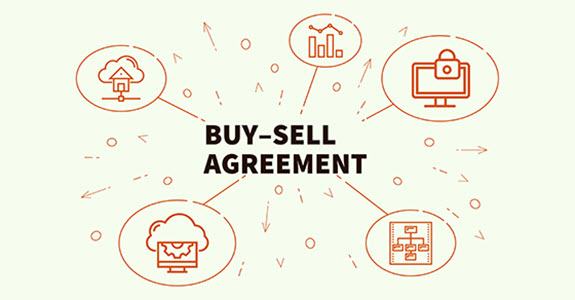Are you considering purchasing a business that will have one or more co-owners? Or do you currently own such a business? If so, implementing a buy-sell agreement is a crucial step. A well-drafted agreement can offer the following benefits:
- Transform your business ownership interest into a more liquid asset
- Prevent unwanted ownership changes
- Avoid complications with the IRS
Agreement Basics
There are two primary types of buy-sell agreements: cross-purchase agreements and redemption agreements (sometimes referred to as liquidation agreements).
Cross-purchase agreements are contracts between you and the other co-owners. Under this agreement, if a triggering event such as death or disability occurs, the withdrawing co-owner’s ownership interest must be purchased by the remaining co-owners.
Redemption agreements are contracts between the business entity and its co-owners. In this arrangement, the business entity is obligated to purchase the withdrawing co-owner’s ownership interest if a triggering event occurs.
Triggering Events
You and your co-owners can specify which triggering events to include in your agreement. Common events to consider are death, disability, and retirement at a specified age. Other events, such as divorce, can also be included based on your preferences.
Valuation and Payment Terms
Your buy-sell agreement should clearly outline the method for valuing business ownership interests. Common valuation methods include a fixed per-share price, an appraised fair market value, or a formula based on earnings or cash flow multiples.
Additionally, the agreement should specify how payments will be made to withdrawing co-owners or their heirs under various triggering events.
Life Insurance to Fund the Agreement
The death of a co-owner is often the most significant and catastrophic triggering event. Life insurance policies can serve as the financial foundation for your buy-sell agreement.
In a simple cross-purchase agreement between two co-owners, each co-owner purchases a life insurance policy on the other. If one co-owner dies, the surviving co-owner collects the insurance proceeds and uses them to buy out the deceased co-owner’s interest from the estate, surviving spouse, or other heirs. The insurance proceeds are generally free from federal income tax, provided the surviving co-owner is the original policy purchaser.
For arrangements involving more than two co-owners, the process can become complex, as each co-owner must buy life insurance policies on all the others. In such cases, using a trust or partnership to buy and maintain one policy on each co-owner can simplify the process. Upon the death of a co-owner, the trust or partnership collects the insurance proceeds tax-free and distributes the cash to the remaining co-owners, who then fulfill their buyout obligations under the cross-purchase agreement.
For redemption buy-sell agreements, the business entity purchases policies on the lives of all co-owners and uses the insurance proceeds to buy out deceased co-owners.
Ensure your agreement specifies that any buyout not funded by insurance proceeds will be paid through a multi-year installment plan. This provides the remaining co-owners with the necessary time to generate the required funds.
Certainty for Heirs
For many business co-owners, the value of their business share constitutes a significant portion of their estate. A buy-sell agreement guarantees that your ownership interest can be sold by your heirs under terms you approved. Furthermore, the price set by a well-drafted agreement establishes the value of your ownership interest for federal estate tax purposes, thereby preventing potential IRS disputes.
As a co-owner of a valuable business, having a comprehensive buy-sell agreement in place is essential. It offers financial protection for you, your heirs, and your co-owners, while also minimizing IRS complications regarding estate taxes.
Buy-sell agreements are complex and should not be handled as DIY projects. Contact us to assist you in setting up a robust buy-sell agreement.






